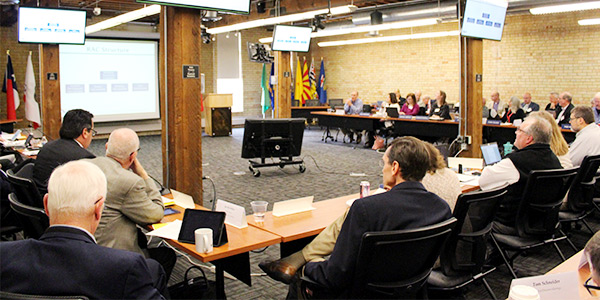By Hudson Sangree
The Western Electricity Coordinating Council continued to deal with issues related to this year’s reliability coordinator transition at its board of directors meeting in Salt Lake City on Wednesday.
Among the matters heard was an update from Peak Reliability CEO Marie Jordan on the wind-down of the company’s operations this year as CAISO, SPP and BC Hydro prepare to take over RC functions across the Western Interconnection by the end of 2019. (See Peak Reliability to Wind Down Operations.)
Keeping key staff on board at Peak and maintaining high operational standards are among the top priorities, Jordan told WECC board members.
Another issue discussed was WECC’s proposed process for requesting key data and information from the incoming RCs under NERC Rules of Procedure Section 1600. The planned move reflects the new operating conditions in a multiple-RC environment rather than one exclusively overseen by Peak, WECC staff said.
“We’ve been working internally for about the past nine months to put this together in anticipation of moving to the multi-RC environment and want to make sure that WECC maintains its options for the receipt of information,” WECC General Counsel Steve Goodwill said.
“Because a Section 1600 request would only apply to U.S. entities, not to our Canadian or Mexican partners [such as BC Hydro], we need a different mechanism to collect data from them,” Goodwill said.
WECC had provided the draft Section 1600 request to incoming RCs and NERC, “totally informally but just for their review and comment before we started any formal process,” Goodwill said. WECC incorporated their comments and changes, and in February it initiated a formal Section 1600 request, he said. The final draft was submitted to NERC and FERC last month for a 21-day comment period, which will be followed by a 45-day period starting Friday for stakeholder comments.
The WECC board still must give final approval to the request. “We would like to have that in place by mid-June at the board meeting so that as the RCs go live, we can issue the data request to them,” Goodwill said. CAISO will assume the RC role for its existing territory on July 1, “so that keeps us on the right timeline.”
Peak Reliability Update
At WECC’s last board meeting in December, speakers expressed concerns about the multiple turnover dates involved in the Western RC transition, each of which could provide opportunities for errors. (See RC Transition Fraught with Pitfalls, WECC Hears.)
After CAISO, BC Hydro will become the RC for most of British Columbia on Sept. 2. CAISO will then take over for many areas outside its footprint on Nov. 1, while SPP will take responsibility for other parts of the West on Dec. 3.
Another area of concern was the ability of Peak to hang on to essential staff members through the long transition.
After announcing it would get out of the RC business and end operations, Vancouver, Wash.-based Peak saw a number of employees depart, Jim Shetler, general manager of the Balancing Authority of Northern California and chair of Peak’s Member Advisory Committee, told the WECC board in December. Some Peak employees in Washington and Colorado took positions with electricity entities in those areas, he said.
To stem attrition, Peak detailed the severance packages that employees will receive if they stay with the company until they’re no longer needed, he said. With that, Shetler said, “the unplanned departures, I expect, will come down quite a bit.”
Peak said in January that of its 169 staff members at the start of 2018, 23 had left by the end of the year. Peak’s RC department declined from 42 staff members to 34 throughout 2018.
Jordan’s presentation to the board seemed to partly confirm Shetler’s prediction that the attrition would abate with increased transparency and communication with employees. Staffing levels in Peak’s RC department have held steady since October, Jordan’s presentation showed, though some engineering and IT employees continued to depart through February.





